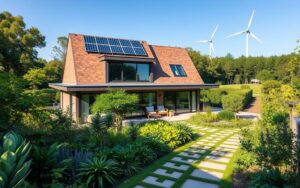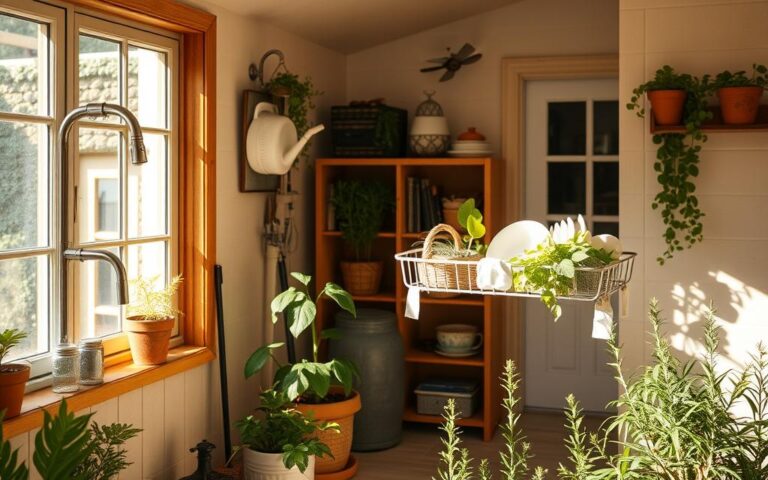Making your home more energy efficient is crucial. Rising energy costs and climate change concerns push us towards sustainability. This piece highlights five ways to boost your home’s energy efficiency, with guidance from the U.S. Department of Energy. By following these strategies, you lower your bills and make your living space better.

Understanding Energy Efficiency in the Home
Energy efficiency means using less power to keep the same comfort level in your home. Homeowners can cut their energy use a lot by doing this. It helps save money and is good for the planet. An eco-friendly house aims to use as little energy as possible while still being comfortable and functional.
Key parts of being energy-efficient include good insulation, using energy-saving windows, and saving energy whenever possible. Insulation is super important. It keeps your house warm in winter and cool in summer without wasting energy. Energy-efficient windows help too. They have double or triple layers that keep unwanted heat out.
Homeowners can also form eco-friendly habits. Doing things like turning off lights when you’re not in the room helps save energy. So does setting timers for your heating or not leaving gadgets plugged in when you’re not using them. To make a house truly eco-friendly, everyone needs to commit to these habits. This helps create a greener way of living.
| Energy Efficiency Component | Benefits |
|---|---|
| Insulation | Reduces heating and cooling costs |
| Energy-Efficient Windows | Minimizes heat transfer |
| Smart Thermostats | Optimizes heating and cooling cycles |
| LED Lighting | Lower energy usage compared to incandescent bulbs |
| Energy Star Appliances | Significantly reduces electricity consumption |
Getting to know and using energy efficiency helps us save money. But it also means we’re doing our part for a sustainable planet.
The Importance of an Energy Efficient Home
Making our homes energy efficient is very important. This approach not only lowers how much energy we use but also cuts down our utility bills in the long run. When we use less energy for heating, cooling, and running appliances, we save money.
Adopting green home solutions makes a big difference for the planet. Every small change at home adds up, showing that people care more about living sustainably. This way, we’re all helping to reduce the harm we do to our environment.
There are also financial perks from local governments and groups for making our homes more energy-efficient. Homeowners who make these smart upgrades can often get money back. This makes the push towards energy efficiency even more worthwhile.
| Energy Efficiency Improvement | Potential Savings (Annual) | Government Incentives |
|---|---|---|
| LED Lighting | $75 – $200 | Up to 30% off retail price |
| Smart Thermostats | $100 – $150 | Rebate programs available |
| High-Efficiency Appliances | $200 – $500 | Manufacturer and utility rebates |
| Home Insulation | $200 – $700 | Tax credits in some states |
Implementing Smart Home Technology
Adding smart home tech helps make our homes use energy smarter. These systems are key in using energy better, letting us get energy-saving tools easier. This leads to big cuts in how much energy we use without giving up comfort.
Tools like Nest and Ecobee smart thermostats change heating and cooling to fit what you like. They learn what you do and cut down on energy use, which saves money. You can even change settings from anywhere, making your home more efficient.
New lighting options from Philips Hue and Lutron adjust automatically. They use sensors and timers so lights are only on when needed, cutting down waste. With these, you can set times or use voice commands to manage energy better.
Sense and EnergyHub monitor energy use in real-time. They show you how your energy is used, helping find ways to use less. This info helps homeowners choose better, saving more energy.
| Smart Home Device | Description | Energy Savings Impact |
|---|---|---|
| Nest Thermostat | Learning thermostat that adjusts based on user behavior | Up to 15% savings on heating and cooling costs |
| Philips Hue | Smart lighting system with energy-efficient bulbs | Up to 80% less energy used compared to traditional bulbs |
| Sense Energy Monitor | Tracks energy use and identifies patterns | Variable savings based on behavior changes suggested by insights |
Using smart home tech helps us live in a more energy-efficient way. It shows that modern energy management leads to savings and is better for the planet.
Energy Efficient Appliances
Choosing the right appliances can significantly reduce home energy use. Energy efficient appliances lower utility bills and help the environment. Look for appliances with the Energy Star label. This means they meet strict guidelines from the Environmental Protection Agency.

- Low energy consumption ratings
- Water efficiency, especially in dishwashers and washing machines
- Innovative technology that enhances performance
Examples of trusted eco-friendly products include:
- Refrigerators: Brands like Samsung and LG offer models with efficient cooling systems.
- Washing machines: Look for Whirlpool and Bosch machines that effectively clean while saving energy and water.
- Dishwashers: GE and KitchenAid provide options that are both powerful and energy-efficient.
These appliances not only save energy but also promote green living. They make eco-friendly choices easy for households. By choosing wisely, homeowners can support sustainability for future generations. It’s a step toward a more responsible lifestyle.
Effective Insulation Techniques
Improving your home’s insulation is key for better energy use. There are many insulation techniques for different parts of your home. The right installation can help you reduce energy consumption and stay comfortable, especially in attics, walls, and basements.
Popular insulation materials include fiberglass, foam board, and spray foam. Each material has its own benefits:
| Insulation Material | R-Value per Inch | Best Application |
|---|---|---|
| Fiberglass | 2.9 – 4.3 | Walls, attics |
| Foam Board | 3.6 – 6.5 | Foundation walls, exterior walls |
| Spray Foam | 3.5 – 6.5 | Attics, crawl spaces |
Focus on insulating these areas well:
- Attics: Good insulation here stops heat loss, boosting energy efficiency.
- Walls: Insulating outside walls slashes heating and cooling bills.
- Basements: Keeping basements insulated stabilizes your home’s temperature.
Using the right insulation techniques makes your home more energy-efficient. This not only cuts down your bills but also helps the environment.
Eco-Conscious Home Upgrades
Making eco-conscious upgrades improves your home’s look and energy use. Adding energy-efficient windows cuts heating and cooling costs a lot. They seal in warmth and cool, making your home comfy all year.
Installing solar panels is also a great choice. Solar energy cuts down electricity costs and lessens use of fossil fuels. It shows you care about saving energy and the planet.
Using sustainable materials is key in eco-friendly home updates. Think about using reclaimed wood and recycled tiles. They’re good for the earth and add character to your home.
These upgrades can also get you tax credits and incentives. So, as you make your home better, you save money and help the planet. It’s a win for everyone.
Green Building Design Principles
Green building design aims to make spaces kind to our planet and efficient for a lifetime. It goes hand-in-hand with sustainable architecture. This means using eco-friendly systems and materials. Homeowners can create homes that are both eco-friendly and cozy by following green design.
Here are the main ideas behind green building design:
- Site selection: Choosing where to build is key. It should cause little harm to the environment and use energy wisely.
- Building orientation: Placing a structure to get the most sunlight improves lighting and cuts down on electric bills.
- Renewable resources: It’s essential to pick materials that don’t harm the planet and that come from a good place.
Using these ideas brings many good things. For example, your bills can go down, and the air in your home can be cleaner. Also, it’s good for our planet. Careful planning turns a house into a model of green living. It shows being eco-friendly can still mean living in style and comfort.
Reducing Energy Consumption with Simple Changes
Small changes in our daily lives can greatly lower energy use. Adopting energy saving habits not only helps the planet. It also saves you money.
Start simple: turn off lights when not in a room. Unplug devices when you’re not using them to save energy. This leads to cost savings over time. Use natural light during the day to reduce the need for electric lights.
Consider these eco-friendly actions too:
- Use energy-efficient bulbs to cut electricity use.
- Adjust the thermostat to save on heating and cooling.
- Take shorter showers to use less hot water energy.
- Shop mindfully to reduce food waste and its energy impact.
Using these strategies helps the environment and promotes energy saving. By making thoughtful choices, we all help create a more energy-efficient future.
Conclusion
Making your home energy efficient is good for both your pocket and the earth. By using the tips in this article, you can cut down on how much energy you use. This helps make a better future for everyone. Things like buying energy-saving devices, insulating well, or using smart tech can make a big difference.
Also, living a green lifestyle can make your home more comfortable and save you money. Small steps like setting your thermostat wisely or choosing energy-saving lights have big benefits. Starting to make your home energy efficient is about making smart choices and keeping at it.
If you want to know more about how to save energy and what programs are available, there are resources to help. The National Renewable Energy Laboratory and your local utility company can offer great advice. By using these resources, you can make eco-friendly upgrades and help protect our planet.
FAQ
What is an energy efficient home?
An energy efficient home uses less energy for heating and cooling. It has better insulation, uses energy-saving appliances, and has a good ventilation system. This makes energy bills lower and helps the environment.
How can I make my home more energy efficient?
To make your home more energy efficient, start with energy-saving appliances. Seal drafts and add the right insulation. Use smart home tech and consider upgrades like energy-efficient windows and solar panels.
What are some common energy saving tips?
Save energy by switching to LED bulbs and using programmable thermostats. Clean HVAC filters often. Unplug devices that aren’t in use. Let natural light in instead of using lamps.
What are the benefits of energy efficient appliances?
Energy efficient appliances use less power or water than normal ones. They save money on bills and are better for the planet. Many also come with rebates as an incentive to buy them.
How does effective insulation contribute to energy efficiency?
Good insulation keeps heat in during winter and out during summer. This cuts down the need for heating and cooling. It saves energy and makes your home more comfortable.
What smart home technology can help with energy management?
Smart thermostats, lighting controls, and energy monitors can track and improve your home’s energy use. This helps make your home more energy efficient and lowers energy costs.
What are eco-conscious home upgrades?
Eco-friendly home upgrades include things like solar panels and energy-efficient windows. Using reclaimed materials and sustainable landscaping are also good choices. These upgrades save energy and add value to your home.
What is green building design?
Green building design is about building in an eco-friendly and efficient way. It reduces energy use through thoughtful planning, material choice, and using renewable energy. It leads to a more sustainable home.
How can I reduce my energy consumption with simple changes?
You can cut energy use with small steps like turning off lights when not needed. Use thermal blinds on windows. Use less hot water and keep heating and cooling systems in good shape.
Are there government incentives for energy-efficient home upgrades?
Yes, there are incentives like tax credits, rebates, and grants for making your home more energy efficient. These help homeowners save money and encourage them to use less energy.




